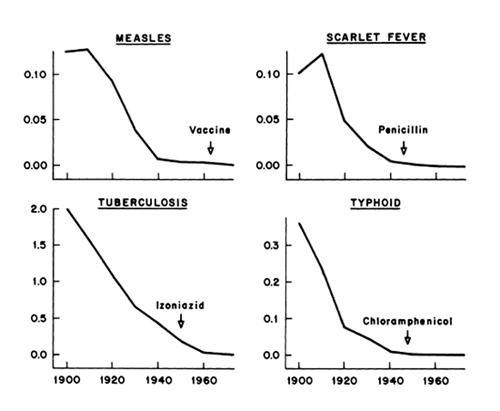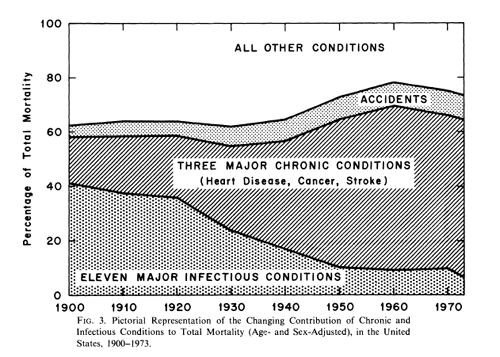This is an excellent review paper from the late 1970s dispelling the myth that
vaccines were responsible for eradicating major diseases in the 20th century.
Download Review Paper: The Questionable Contribution of Medical Measures to the Decline of Mortality in the United States in the Twentieth Century
There is an excellent quote at the beginning of this review paper from Rene Dubos (R. Dubos, Mirage of health, New York: Perennial Library, 1959, p. 23) that nicely summarises the reality:
 ". . . by the time laboratory medicine came effectively into the picture the job had been carried far toward completion by the humanitarians and social reformers of the nineteenth century... When the tide is receding from the beach it is easy to have the illusion that one can empty the ocean by removing water with a pail."
". . . by the time laboratory medicine came effectively into the picture the job had been carried far toward completion by the humanitarians and social reformers of the nineteenth century... When the tide is receding from the beach it is easy to have the illusion that one can empty the ocean by removing water with a pail."
Some of the statistical data represented in graphical form in this paper. The first shows mortality decline rates along with indication of the time of medical intervention (vaccines or antibiotics).

The second shows overall contribution of the major 20th century diseases to mortality by chronic illness.

You can see in the above chart that the major "infectious" diseases had declined substantially prior to widespread medical intervention in the form of antibiotics and vaccines.
And a quote from the end of the paper:
 In general, medical measures (both chemotherapeutic and prophylactic) appear to have contributed little to the overall decline in mortality in the United States since about 1900-having in many instances been introduced several decades after a marked decline had already set in and having no detectable influence in most instances. More specifically, with reference to thosefive conditions (influenza, pneumonia, diphtheria, whooping cough, and poliomyelitis) for which the decline in mortality appears substantial after the point of intervention-and on the unlikely assumption that all of this decline is attributable to the intervention-it is estimated that at most 3.5 percent of the total decline in mortality since 1900 could be ascribed to medical measures introduced for the diseases considered here.
In general, medical measures (both chemotherapeutic and prophylactic) appear to have contributed little to the overall decline in mortality in the United States since about 1900-having in many instances been introduced several decades after a marked decline had already set in and having no detectable influence in most instances. More specifically, with reference to thosefive conditions (influenza, pneumonia, diphtheria, whooping cough, and poliomyelitis) for which the decline in mortality appears substantial after the point of intervention-and on the unlikely assumption that all of this decline is attributable to the intervention-it is estimated that at most 3.5 percent of the total decline in mortality since 1900 could be ascribed to medical measures introduced for the diseases considered here.
These conclusions, in support of the thesis introduced earlier, suggest issues of the most strategic significance for researchers and health care legislators. Profound policy implications follow from either a confirmation or a rejection of the thesis. If one subscribes to the view that we are slowly but surely eliminating one disease after another because of medical interventions, then there may be little commitment to social change and even resistance to some reordering of priorities in medical expenditures. If a disease X is disappearing primarily because of the presence of a particular intervention or service Y, then clearly Y should be left intact, or, more preferably, be expanded. Its demonstrable contribution justifies its presence. But, if it can be shown convincingly, and on commonly accepted grounds, that the major part of the decline in mortality is unrelated to medical care activities, then some commitment to social change and a reordering of priorities may ensue. For, if the disappearance of X is largely unrelated to the presence of Y, or even occurs in the absence of Y, then clearly the expansion and even the continuance of Y can be reasonably questioned. Its demonstrable ineffectiveness justifies some reappraisal of its significance and the wisdom of expanding it in its existing form.
Also worthy of mention and reference is the work of Thomas Mckeown whose pioneering work for three decades from the 50s to the 80s helped establish the fact that it was mainly social changes that resulted in decline in mortality by disease - specifically better nutrition, better sanitation and general improvements in standards of living.
 Articles
Articles


 ". . . by the time laboratory
". . . by the time laboratory 








